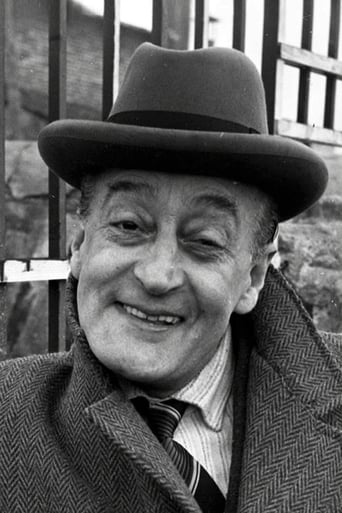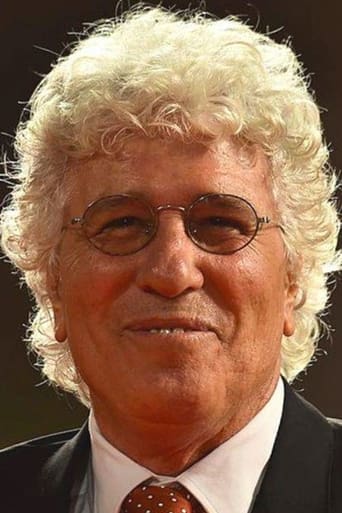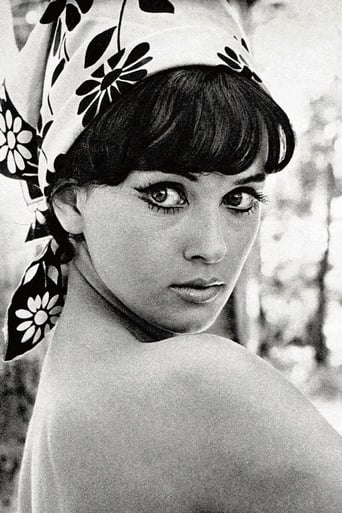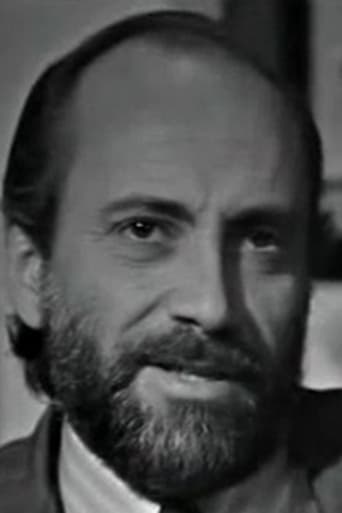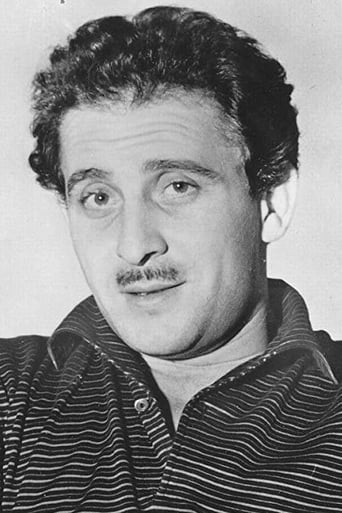Grimerlana
Plenty to Like, Plenty to Dislike
Smartorhypo
Highly Overrated But Still Good
Pacionsbo
Absolutely Fantastic
Cheryl
A clunky actioner with a handful of cool moments.
guedesnino
In "Uccellacci and Uccellini" we have truth, naturalness and authenticity so well incorporated and structured that it is hard to believe in the possibility of comedy in the face of such harsh realities and of a world where people use the hardness of their lives as materiality for laughter . A particular work in his proposal and among many reasons, a rare work.Written and directed in 1966 by Pier Paolo Pasolini, "Uccellacci and Uccellini" is one of those films that generate immediate division, there are no half terms. Particularly, I consider it as a special film, but that already shoots in ample start for my appreciation, for the respect and admiration that I feel for Italy, for its history in the cinema and by diverse actors, among them Totò Innocenti."Uccellacci e Uccellini" has all the key characteristics of the Neorealist style, and deals with Marxist concerns about poverty and class conflict, but without losing his humor, which, by the way, generates great power and importance of this work, Uniting political reflections, social construction and having as a midfield, humor, Pasolini achieves a comprehensive and active dialogue, places the viewer in a critical and reflective situation, delivers a work open to laughter, but not limited to that. To overcome the limits of a common or simplistic comedy, it was, but of what it necessary to count on the support of the Italian actor Totò Innocenti.This was Totò Innocenti's last film. After the death of the actor, two other films were released, but in both productions, the filming took place long before "Uccellacci and Uccellini". Totò in 1966 was already more than a consecrated comedian, his figure was a mark and renowned of Italy, having the recognition of his work expanded to other countries and continents, it is not for nothing that he is part of a select group where the actors are present Charlie Chaplin and Buster Keaton. We can see in Uccellacci and Uccellini a more restrained Totò, which generates a certain strangeness for those who already know it of previous works, much of this half disengaged, sometimes even plastered originate from the direction of Pasolini, who limited the improvisations, The game and even the face masks of the actor, requests that denied the characteristics that made Totò a celebrated comedian. It is necessary to understand that the requests of Pasolini were not ways to cut or to diminish the work of Totò, on the contrary, knowing the artistic quality of the comedian, Pasolini sought to present a punctual work and that dialogued with the neorealistas proposal of the film, besides being a Great opportunity that Pasolini offers to the great Totò.In "Uccellacci and Uccellini" we have truth, naturalness and authenticity so well incorporated and structured that it is hard to believe in the possibility of comedy in the face of such harsh realities and of a world where people use the hardness of their lives as materiality for laughter . A particular work in his proposal and among many reasons, a rare work. The allegory created by Pasolini, unifies aspects of Marxist philosophical fable.As in all fairy tales, there is a definite story in this film: the narrative pretext is given by the philosophical (Marxist) considerations of an old raven that approaches two men, father (Totò) and his son (Davoli). The crow seems to convince the two men, using his wisdom and his words, but the moment the problem of hunger appears, the "reasonable" man reveals himself, and Totò ends up eating the wise crow. The allegory presented is clear and well performed.Regarding the neo-realist considerations presented in the film, I can categorize them through André Bazin, a French cinema theorist and critic, arguing that neorealism portrays: truth, naturalness, authenticity and is a cinema of duration. The necessary characteristics of neo-realist cinema include: A defined social context; A sense of historical reality and immediacy; Political commitment to progressive social change; Authentic scenes and scenery with its location, as opposed to the artificial studio; A rejection of classic Hollywood styles; Extensive use of non-professional actors as much as possible; A documentary style of cinematography."Uccellacci and Uccellini" is reportedly the work that Pier Paolo Pasolini most loved, probably because it is the most complete synthesis of his artistic eclecticism. It is a work with great poetic power, from the beginning was the object of discussion and controversy. He got a special mention at the Cannes Film Festival and was awarded the silver prize.
johnstonjames
hilarious. an operatic voice screams out the names of the production crew during the opening titles. this sets the mood for a riotous comedy satire about little crows that walk with you and speak idealism, St. Francis of Assisi, and moody over sexed clowns.and this is probably one of Pasolini's milder films. at least it wasn't 'Salo'. i have a lot of respect for 'Salo' technically, especially since i saw the beautiful Criterion Collection restoration. but i find Sade really hard to take and 'Salo' can be so disgusting it just makes the whole Sade thing worse. aside from a little sexual suggestion, 'Hawks and the Sparrows' is almost a family film. almost. i don't think any Pasolini film is for children or families.this is also one of the more humorous and sweetly oddball of all the Paolini films i've seen. aside from the cruelty dealt the little crow at the end, most of the situations are played for sentiment and humor.i didn't think the little crow deserved his fate at the end. even if he was being tiresome and boring. but i've seen cuter crows. the crow here was kinda scruffy. the street i live on is pretty much "crowhaven farm". i mean the crows literally flock here in large groups and i try to feed them because they're really cute and can hop around in the most adorable way. so if you want to see really cute crows i suggest you try my street.
jotix100
A picaresque approach by a master of the Italian cinema resulted in this personal and different film by Pier Paolo Pasolini. The director, who wrote and produced this picture, was in great form in this story that is more like a fable, deliciously acted by Toto and Ninetto Davoli, one of the best pairings in Pasolini's movies.The film is, in many aspects, a road movie. From the beginning, we watch as Toto and Ninetto take to the road in their trip to nowhere, it seems, but a trip which permits Pasolini examine some of the things that obsessed him, mainly his dislike for organized religion, as he perceived it in his country, as it clashed with reality. He takes the life of Saint Francis and the story about his relationship with the birds as the main topic for the movie.It's hard to add anything else to what already has been said by the valuable contributions to IMDb. This film is one of the most inspired by the director. In it, he doesn't pound on the viewer's head those things that were dear to him. In fact, the film has a whimsical touch as we follow the two travelers, Toto and Ninetto, through rural Italy as a raven keeps telling them stories.Toto is perfect as the older man who is living in his own world and doesn't see the changes around him. Ninetto Davoli gives a great performance as the happy go lucky son. Their surname, is Innocenti, or Innocent, which in a way, fits their characters rather well.The black and white cinematography by Mario Bernardo and Tonino Delli Colli works wonders for the film. Ennio Morricone's musical score also enhances all that one sees on the screen. This is a light Passolini, but one that delves deep into the subjects that were so dear to the director's heart.
Claudio Carvalho
Innocenti Totò (Totò) and his son Innocenti Ninetto (Ninetto Davoli) are drifting in a road in Italy, when they meet a Marxist speaking crow. The trio travels together in a long journey, but when hunger increases, the crow is simply eaten by the drifters."Uccellacci e Uccellini" is an original and critical surrealistic fable about the fate of the leftist ideology in the view of Pasolini. Although dated, the lead story is good, using the successful style of road-movie of the 50's explored by other Italian directors, like Fellini or Rossellini; but like a machine gun, Pasolini shots everywhere making the plot diffused, confused and sometimes boring. Totò has good performance, but Ninetto Davoli in his debut is very silly, with a forced smile on his face. The DVD released in Brazil by the minor Brazilian distributor Mediagroup is surprisingly good, presenting restored image and having lots of extras inclusive a documentary of 28 minutes running time about Pier Paolo Pasolini. There is a mistake in the Audio Menu: the 5.1 option shows indeed the movie with comments in Italian. But this minor mistake does not diminish the value of the Brazilian DVD. My vote is five.Title (Brazil): "Gaviões e Passarinhos" ("Hawks and Sparrows")


